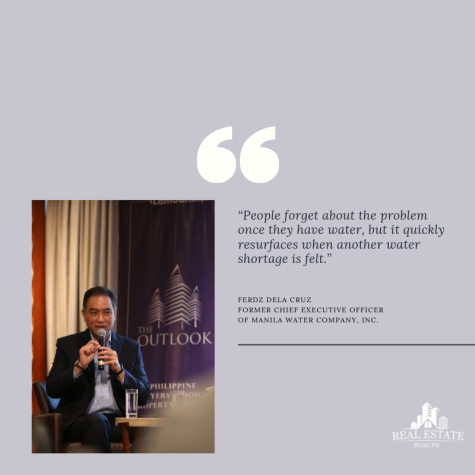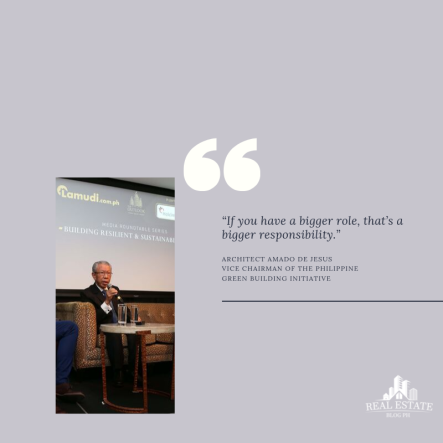
Continuing its Media Roundtable Series, Lamudi, the Philippines’ leading real estate platform tackled climate change as a global issue.
Held on September 27, 2019 in Makati Shangri-La Hotel and in partnership with Holcim Philippines and Subdivision and Housing Developers Association (SHDA), the event mas moderated by no less than Lamudi CEO Bhavna Suresh.
Here are some of the meaningful quotes cited by its panelists:
Highlighting Resilience
The panelists who came from different sectors have their own stand on the matter.
“Most of our coastal municipalities want to be cities eventually. How do we push them towards not just sustainability but also push them to also look at measures that will make them resilient as well?”
Atty. Angela Ibay
Head of the Climate and Energy Program of the World Wide Fund for Nature
“It’s not a question anymore of whether you can control climate change or not. It’s about adapting to the effects of climate change. It’s here. We are experiencing it now.”
Wesley Caballa
Senior Manager for Sustainability of Costa Del Hamilo Inc.
“We are already in an area of the world that is highly, highly susceptible to all these natural disasters, and climate change made us more vulnerable to that.”
Justine Santos-Sugay
Director for Resource Development and Communications of Habitat for Humanity
In a country that is dotted with high-rise mixed-use buildings and humble coastal homes, the effort to save the environment is tightly coupled with the measures developers can take to safeguard the value of their legacy. One solution, something as simple as planting trees. However, it is not enough.
Hamilo is one of many companies that have started making changes in keeping with a more climate-conscious business ethos.
Addressing Roadblocks to Sustainability
The Philippines has not been remiss when it comes to sustainable efforts. One of the problems developers and real estate experts face, however, is misinformation or lack of dissemination at the grassroots.
Here are some meaningful quotes from the panelists:
“When you think about it, when you look at the issue of climate change, climate change seems to exaggerate or re-highlight a lot of the already pre-existing social themes.”
Santos-Sugay
One issue all Filipinos will relate to, especially in the Philippine capital, is the water shortage. Despite the typhoons that visit the country and leave damage in low-lying areas, there is water shortage because the rainfall missed the dams that are meant to supply water to the majority of the city.
“It’s up to us to make hard choices for us to be resilient. There are no easy choices at this point. For us to make that, we need to have a constructive dialog and without the misinformation.”
“People forget about the problem once they have water, but it quickly resurfaces when another water shortage is felt.”
Ferdz dela Cruz
Former Chief Executive Officer of Manila Water Company, Inc.
Sustainability in the Commercial and Industrial Sectors
Much of the effort real estate developers have put into sustainability can be seen in the commercial buildings they have strategically positioned in key cities.
“There is an estimate that the tenant will save about 20% in terms of energy consumption because the way the building is built is very efficient.”
“Prospective tenants would rather pay a little bit more rent” when they know the building will take care of their employees.”
Jaime “JJ” Fernandez
Strategic Management Consultant of Menarco Development Corporation
This, paired with Dela Cruz’s observation that people will be more responsible if the problem pinches their bill, makes the case for green developments: rather than lose money in inefficient designs, developers, tenants, and residents can save by prioritizing sustainability.
The Philippines, which receives ample sunlight because of its equatorial location, can do more to utilize solar energy, one of the most efficient ways to be sustainable.
“Residential scale has always been the goal, but not in the beginning. Typically, when a country starts developing solar projects, it always starts with utility, then it goes to commercial-industrial rooftops, then it goes residential.”
“If we combine all the roofs in the entire Metro Manila, we would have enough solar energy to power the entire Philippines.”
James Buskowitz
Chief Executive Officer of Buskowitz Group
Trickling to the Residential Developments
Lamudi’s CEO says climate change is not an isolated problem: “All of these inequalities that exist in the world today are getting heightened because of global warming.”
To get to the finish line, where a more climate-resilient Philippines awaits, each individual has to make impactful changes, but at the forefront are the bigger organizations that can influence those in their respective industries as well.
With miscommunication proving to be a big roadblock, the discussion needs to be sustained. This is one of the reasons for the creation of the Lamudi media roundtable.
“If you have a bigger role, that’s a bigger responsibility.”
Architect Amado de Jesus
Vice Chairman of the Philippine Green Building Initiative

“Lamudi is a giant brand. With all the buildings that are together, the organizations that you have a big influence on, you can create a big impact,” says de Jesus.
#realestateblogph
#realestateblogph3rdLamudiRoundtableSeries
#lamudi







More Stories
Rockwell adjusts property projects to ‘new normal’
Brokers almost gone broke
Pag-IBIG loan policies set to help borrowers keep homes amid pandemic